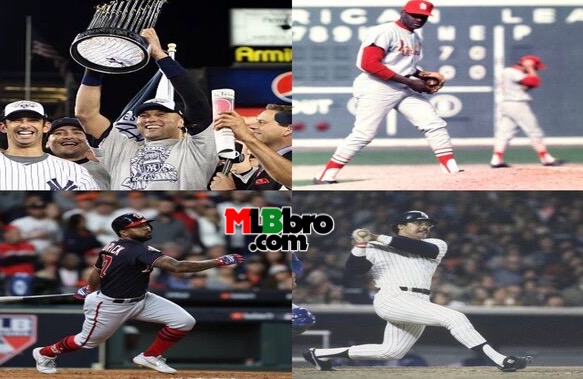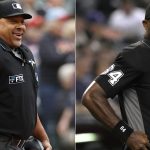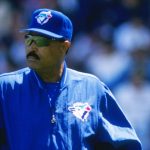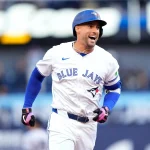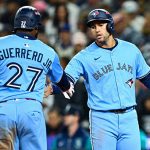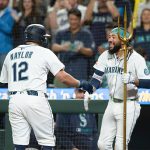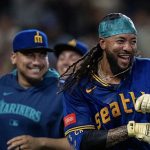For many sports fans in October, there are only three meaningful words: The World Series. It’s the time when legacies and reputations are forged. It’s a time when a good ballplayer becomes legendary or when a utility player can go from being anonymous to the talk of the town.
Some players shine under the bright lights of the Fall Classic. Others can find themselves exposed to scrutiny that lasts a lifetime. One bad pitch or misplayed ball can take you from hero to goat. Today, we take a look at the MLBbros who’ve used the World Series as a canvas to showcase their athletic gifts. For many of them, it became the signature moment of their baseball lives and beyond.
We’ll take a look at these moments in chronological order.
Willie Mays and “The Catch”
Back in 1951, Mays, along with Monte Irvin and Hank Thompson, made history by comprising the first all-black outfield in World Series history. Three years later, the “Say Hey Kid” etched his name forever in baseball history with his famous catch off Cleveland’s Vic Wertz in Game 1 of the Fall Classic. Mays saved the day in the eighth after leadoff singles by Larry Doby and Al Rosen led to starting pitcher Sal Maglie being lifted for Don Liddle. Wertz’s drive to deep center field would have scored both if not for the Hall of Famer’s acrobatic catch.
Jackie Robinson and “The Steal”
Next year would finally come in 1955 for the residents of Flatbush and their beloved “Bums”. Ironically, they lost Game 1 (6-5) to the Yankees. But it was Jackie’s daring steal of home that set the tone for the eventual Dodgers’ series win. To this day, both Yogi Berra and Whitey Ford argued that Robinson was easily out, with Ford pointing out that he knew Robinson was far off of third base, and deliberately did a longer wind-up, instead of pitching from the stretch as pitchers usually do with runners on base, to entice Robinson into trying to steal home plate. Berra claimed that he was able to catch the ball and position his glove for Robinson to slide into the tag. However, history has said otherwise, and the moment has been crystallized forever in baseball lore.
Gibby’s Legacy
The name of Bob Gibson remains a considerable part of the history of the Fall Classic. In 1964, he won the Series MVP award for his 2–1 record, 3.00 ERA, and 31 strikeouts in 27 innings pitched. This included pitching his third start in the Series (Game 7) on two days’ rest. Three years later, Gibby won his second World Series MVP in another 7-game St. Louis triumph. He cemented his reputation as an unhittable postseason pitcher in this series, allowing only three total runs over three complete games. In Game 7, he allowed only three hits, striking out 10 batters and even adding a home run blast of his own in the fifth. A year later, in Game 1, Gibson outdueled 30-game winner Denny McLain by setting a World Series record with 17 strikeouts in a 4-0 win.
Agee, Clendenon, & One Big Miracle
The Amazin’ Mets are still one of the most beloved teams in recent baseball history. However, it was Tommie Agee and Series MVP Donn Clendenon that etched their names in the Fall Classic forever. In Game 3, Agee led off the game for the Mets with a home run off Jim Palmer, then saved at least five runs with his defense. With two out in the fourth and Oriole runners on first and third, Agee raced to the 396-foot sign in left-center and made a backhanded running catch of a drive hit by Elrod Hendricks.
In the seventh, the Orioles had the bases loaded with two out, but Agee made a diving grab of a line drive hit by Paul Blair in right-center. As for Clendenon, he batted .357 (5 for 14) with three home runs and four RBI during the series. His three home runs remained tied for the most home runs in a five-game Series until Freddie Freeman broke the record with four in last year’s Fall Classic.
While the 1970 Fall Classic is remembered for the fielding prowess of Brooks Robinson, it also serves as a barrier breaker for umpire Emmett Ashford. After becoming the majors’ first black umpire in 1966, Ashford would break the glass ceiling, becoming the first black umpire in the World Series. Previously, Ashford spent 12 years in the Pacific Coast League, becoming known for his exuberance, showmanship, and energy, even interacting with the crowd between innings. While some observers believed that race prevented him from working in the majors earlier than he did, others maintained that his flashy style actually delayed his major league debut due to umpires’ general disdain for drawing attention to themselves. Either way, Ashford’s moment should not be forgotten.
Reggie and the Legend of Mr. October
Even though Reggie Jackson was a member of three World Series title teams before he reached the Big Apple, it was his time in pinstripes that cemented his “Mr. October” moniker forever. After hitting a homer in Game 5, Jackson used Game 6 as his signature Fall Classic moment. Jackson walked and scored in front of Chris Chambliss’ homer in the second inning. In the next inning, Jackson turned on a Burt Hooton fastball and put it into the right field seats for a one-run Yankees’ lead. Two innings later, Jackson connected on the first pitch off Elias Sosa, a screaming low line drive into the right field seats to make the score 7–3. Leading off the bottom of the eighth, Jackson strode to the plate and drove the first Charlie Hough knuckleball he saw 475 feet into the center field bleachers for an 8–3 lead; he became the first to hit three home runs in a World Series game in 49 years, since Babe Ruth. With his Game 5 first-pitch homer (in the eighth) and his four-pitch walk in the second inning of Game 6, Jackson homered on his last four swings of the bat in the Series, each off a different Dodger pitcher.
Pops Stargell and the Family
After struggling during his first World Series appearance in 1971, Willie Stargell emerged again eight years later as the leader of the Pittsburgh “Family”. The Pirates claimed the NL East crown on the last day of the season. His play on the field inspired his teammates and earned him the MVP awards in both the NLCS and the World Series. Stargell capped off the year by hitting a dramatic home run in Baltimore during the late innings of a close Game 7 to seal a Pirates’ championship. The home run was his third of the series and, coincidentally, credited Stargell with the winning runs in both Game 7s of the two postseason meetings between the Pirates and the Orioles (1971 and 1979). The 1979 World Series victory also made the Pirates the only franchise in baseball history to twice recover from a three-games-to-one deficit and win a World Series (previously they had done so in 1925 against the Washington Senators). For the series, Stargell went 12-for-30; along with his three home runs, he also recorded four doubles for 25 total bases.
Puckett says, “We’ll See You Tomorrow Night”
The 1991 World Series featured a pair of “worse to first” teams in the Atlanta Braves and Minnesota Twins. It was also one of the most exciting Fall Classics as five of its games were decided by a single run, four decided in the final at-bat, and three went into extra innings. Going into Game 6, the Twins trailed three games to two, with each team having won their respective home games. Kirby Puckett gave the Twins an early lead by driving in Chuck Knoblauch with a triple in the first inning. Puckett then made a leaping catch in front of the Plexiglass wall in left field to rob Ron Gant of an extra-base hit in the third. The game went into extra innings, and in the first at-bat of the bottom of the 11th, Puckett hit a dramatic game-winning home run on a 2–1 count off of Charlie Leibrandt to send the Series to Game 7. This dramatic game has been widely remembered as the high point in Puckett’s career. The images of Puckett rounding the bases, arms raised in triumph (often punctuated by CBS television broadcaster Jack Buck saying “And we’ll see you tomorrow night!”) are frequently included in video highlights of his career.
Cito, Joe, & the Canadian Repeat
On the heels of the Blue Jays’ making their first World Series since 1993, we have to give Cito Gaston, the architect of their back-to-back title teams. After several years of coming close, Toronto finally broke through in 1992 and became the first non-American team to win the Fall Classic. Most importantly, the soft-spoken Gaston would also become the first black manager to win the World Series. A year later, despite losing several players (i.e., Dave Steib, Derek Bell, and Dave Winfield), the Blue Jays repeated as AL champs. In the World Series against the upstart Philadelphia, the Blue Jays defeated the Phillies in six games, becoming the seventh franchise in MLB history to win back-to-back championships. Joe Carter’s iconic 3-run homer off Mitch Williams was the series winner. It was only the second Series concluded by such a home run since Bill Mazeroski in 1960.
Jeter becomes Mr. November
With the backdrop of the 911 disaster still in everyone’s radar, the New York Yankees would reach the 2001 World Series against the Arizona Diamondbacks. Due to the attacks, the start of the Fall Classic was delayed, and the season’s end was extended beyond the usual October timeframe. Game 4 of the series marked the first time that any non-exhibition MLB game had been played in November. Enter the Captain, Derek Jeter. In extra innings, Jeter hit a game-winning home run off Byung-Hyun Kim. The words “Mr. November” flashed on the scoreboard, alluding to former Yankee Reggie Jackson’s nickname, “Mr. October”. It came nearly a month following his iconic hustle play against the Oakland A’s in the ALDS.
Howie calls “game”
The Washington Nationals began the 2019 season with a 19–31 (.380) record following an 81-81 mark a year earlier. Despite rumors of manager Dave Martinez being fired during the All-Star break, Washington would rally, ending the year with a 93–69 (.574) record and a wild-card playoff berth. After hitting .344 during the regular season, Howie Kendrick became one of the main cogs during Washington’s improbable title run. In Game 5 of the NLDS, he hit a grand slam in the 10th inning off the Dodgers’ Joe Kelly to give the Nationals a 7-3 lead that held up as the final score, advancing the Nationals to the NLCS. He went 5 for 15 with four doubles and 4 RBIs in the Nationals’ four-game sweep of the Cardinals, earning the NLCS MVP. In Game 7 of the Fall Classic, Kendrick hit a go-ahead home run off Houston’s Will Harris that struck the screen on the right field foul pole. His efforts paid off as the Nationals won 6-2, giving them their first championship in franchise history.

